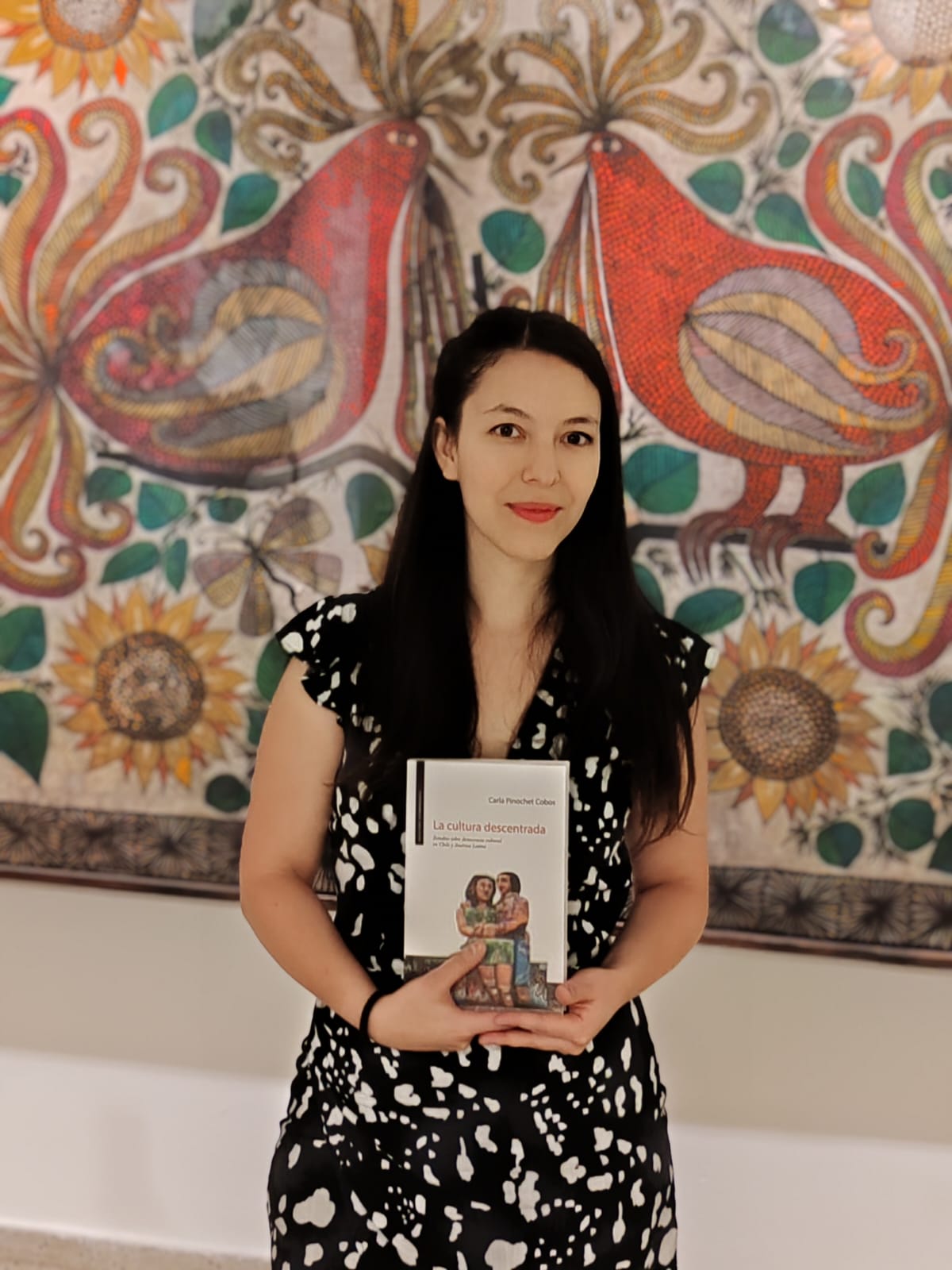Book Launch: “Decentered Culture. Studies on Cultural Democracy in Chile and Latin America” by Carla Pinochet Cobos
This Thursday, December 12th and Friday, December 13th, the “Interdisciplinary Research Meeting on Arts and Cultural Practices for Social Transformation” will be held at the GAM. This event, promoted by the Center’s research department, aims to promote dialogue, reflection, and critical thinking around cultural and artistic expressions
Here, Carla Pinochet Cobos, academic and alternate director of CMUS, will present her book, “Decentered Culture: Studies on Cultural Democracy in Chile and Latin America,” on Friday the 13th at 10:00 a.m.
Recently published by UAH Editions, the book is structured around four axes that seek to follow the path of the cultural cycle: culture and the city, cultural production, mediation, and cultural reception and participation. Through these, Pinochet Cobos draws a multidimensional map of how we understand, produce, and experience culture.
The book brings together essays written by the academic over the last 10 years. The first chapter, “Culture and City,” explores how the arts and cultural phenomena trigger reflections on public space and our coexistence. It includes examples such as cultural festivals in cities like Santiago and Concepción, interventions in Villa San Luis, and artistic expressions of social unrest. The second addresses cultural production and the tensions of creative work, marked by precarious working conditions. The third is about mediation, analyzes museums and cultural institutions as spaces for social reflection. Finally, the last chapter explores cultural participation, understanding reception as a creative act. All these levels and cases speak today to the contemporary challenges of cultural democracy.
Overall, the book analyzes how society moves from a narrow notion of culture, associated with the fine arts and aesthetics, to a broader, anthropologically based one that includes everyday elements such as rituals, cuisine, and clothing.
“Cultural products can be platforms for reflecting on our contradictions and differences. They allow us to imagine alternative ways of living together and challenge the neoliberal normalcy that often renders certain narratives invisible. Culture, in this sense, is an act of resistance and a driving force for collectively constructing who we are and who we want to be,” explains Carla Pinochet.
The concept of “decentering” refers to what is happening with the definition of culture. How we move from a narrow notion of culture, associated with the fine arts and aesthetics, to a broader, anthropologically based one that includes everyday elements such as rituals, cuisine, and clothing. “This can be understood as a transition from cultural democratization, which sought to disseminate “legitimate” culture, to cultural democracy, which validates the diversity of cultural expressions and promotes participation. It should be noted here that this diversity involves controversy and disagreement: cultural democracy obliges us to pay attention to certain uncomfortable cultural objects,” says Pinochet Cobos.
Another interesting point in the book is that related to job insecurity as a constant in the creative fields, both in Chile and in other countries. According to the author, the interest is not only to denounce these conditions, but also to understand some of the paradoxes of the sector. Why do many artists resist conceptualizing their work as “job”? This is linked to values such as freedom, autonomy, and creative passion, which often clash with traditional labor regulations and echo emerging models of neoliberal work.
Written by anthropologist Néstor García Canclini, reflects on the book’s themes and the concept of democratization the prologue, addresses:
“How can we think together about the seclusion still required for autonomous works, the media and their products disseminated through streaming, the malaise of artists who call themselves workers and find the promises of the creative economy diluted into precariousness? If culture is so dispersed, it cannot be democratized with policies that, for half a century, have insisted only on expanding its dissemination. This book is based on fieldwork in traditional or performative museums and with their users in Chile, Paraguay, and Peru, following the practices of creators and readers in Mexico, the contradictory convulsions of citizen participation, urban memories, the euphoria and disappointment in political mobilizations that use the languages of the arts to communicate their imaginaries and rebellions.”
Decentered culture invites us to rethink cultural policies, not as transmitters of an established “canon,” but as tools for inclusion and social transformation. At a time when social tensions and political divisions are setting the tone, Pinochet Cobos’s book is a call to decentralize, democratize, and rediscover culture.


